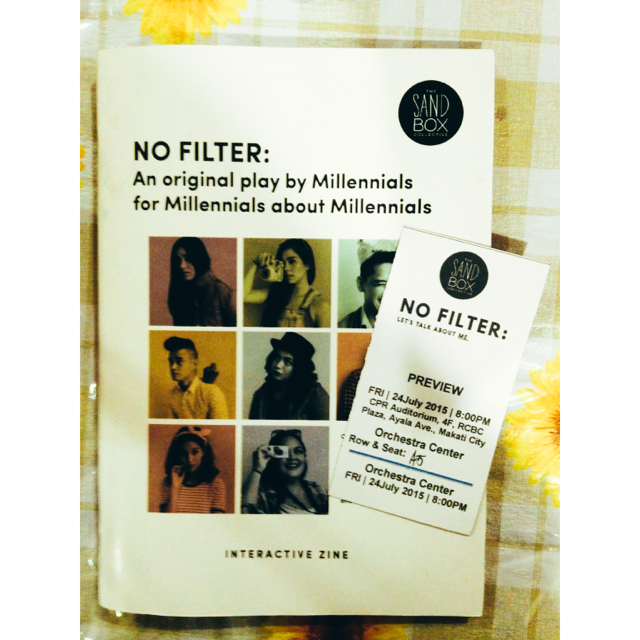
REVIEW: “No Filter” is original and relatable
Time Magazine called millennials “narcissistic, overconfident, entitled, and lazy”. While this may prompt most millennials to cry foul over such a generalization, The Sandbox Collective reacts in a different way—by owning up to the narcissism and staging a series of monologues where millennials talk about themselves.
Five friends enter, armed with their devices, talking about how everybody is talking about their generation. Director Toff De Venecia couldn’t have assembled a more personable cast for this original production. There’s an underdog element to the whole thing, with half the cast taking the stage for the first time and some others coming back to it after years of hiatus. If there is trepidation in the first timers, you don’t see this on stage. Each of the cast members were able to give justice to their respective materials. Some even gave knock-out performances (Jasmine Curtis-Smith in “The Interview”, Sarah Facuri in “I Sucked When I Was Happy”, and Cai Cortez and Micah Munoz in “Intimacy”).
The real star of the show, however, is the writing. Seventeen writers contributed their unique voices to develop these monologues and it allowed the show to offer varied points of view. Some of the monologues were utterly hilarious. “Apps You Should Check Out Right Now” and “Love Me Tinder” had the audience in stitches. From a walk-through of the old days of the internet in “Downloading in Progress” to the internal struggles of religion and society in “Confession”, the show is like watching your favorite Thought Catalog or Buzzfeed article come to life. When the monologues try to strike an emotional chord, however, they do so by sacrificing its relatability. Pieces like “Moving Out” and “Coming of Age”, while superbly acted, felt less impactful than the others.
While older audiences may be able to gain insight on why millennials are the way they are, the show is still largely for millennials themselves. What’s truly exceptional about this show is the way it has articulated emotions and situations young people might think no one else is feeling or experiencing. The show might have sought out to try and define what it means to be a millennial, but its greatest achievement is helping these young people in the audience feel less alone.
“No Filter” is self-aware but never annoying. It doesn’t present caricatures or shoehorn millennials as one way or another but instead, paints a portrait of young individuals that are as smart, complicated, and creative as they can be narcissistic, overconfident, and entitled.



Comments